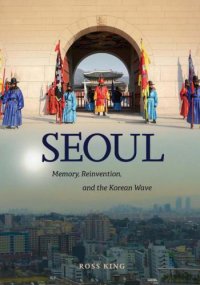
Ebook: Seoul: memory, reinvention, and the Korean wave
Author: King Ross
- Tags: Architecture, Architecture--Corée du Sud--Séoul, Architecture--Corée (République)--Séoul, Architecture--Korea (South)--Seoul, Histoire, History, Architecture -- Korea (South) -- Seoul, Seoul (Korea) -- History, Séoul (Corée) -- Histoire, Architecture -- Corée du Sud -- Séoul, Korea (South) -- Seoul, Architecture -- Corée (République) -- Séoul
- Year: 2018
- Publisher: University of Hawaii Press
- City: Korea (South);Seoul;Séoul (Corée);Seoul (Korea
- Language: English
- epub
Introduction: Contested memory -- Erasure and reinvention : Korea to 1945 -- Re-imag(in)ing the nation : Seoul and Park Chung-hee -- Erasure as heritage : reading Seoul -- New culture : Seoul in the Korean wave -- Imagining the nation : reinvention and its conditions of possibility -- Appendix: A Seoul chronology.;Seoul is a colossus both in its physical presence and the demand it places on any intellectual effort to understand it. How did it come to be? How can a city this immense work? Underlying its spectacle and incongruities is a city that might be described as ill at ease with its own past. The bitter rifts of Japanese colonization persist, as does the troubled aftermath of the Korean War and its divisions; the economic "Miracle on the Han" that followed is crosscut by memories of the violent dictatorship that drove it. In Seoul, author Ross King interrogates this contested history and its physical remnants, tacking between the city's historiography and architecture, with attention to monuments, streets, and other urban spaces. The book's structuring device is the dichotomy of erasure and memory as necessary preconditions for reinvention. King traces this phenomenon from the old dynasties to the Japanese regime and wartime destruction; he then follows the equally destructive reinvention of Korea under dictatorship to the brilliant city of the present with its extraordinary explosion of creativity and ideas-the post-1991 Hallyu, the Korean Wave. The final chapter returns to questions of forgetting and memory, but now as "conditions of possibility" for what would seem to underlie the present trajectory of this extraordinary city and culture. Seoul can be read, King suggests, in the context of the hybrid ideas that have characterized Korean cultural history. It may be their present eruption that accounts for the city of contradictions that confronts the contemporary observer and that most extraordinary of Korean phenomena: the rise of an alternative, virtual world, eclipsing both city and nation. Has the very idea of Korea been reinvented even as the weakly defined nation-state slips away?
Download the book Seoul: memory, reinvention, and the Korean wave for free or read online
Continue reading on any device:

Last viewed books
Related books
{related-news}
Comments (0)